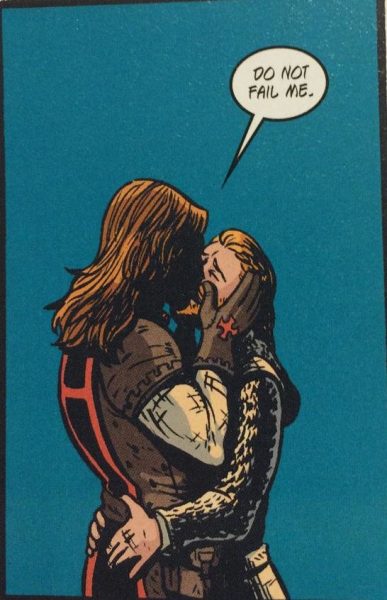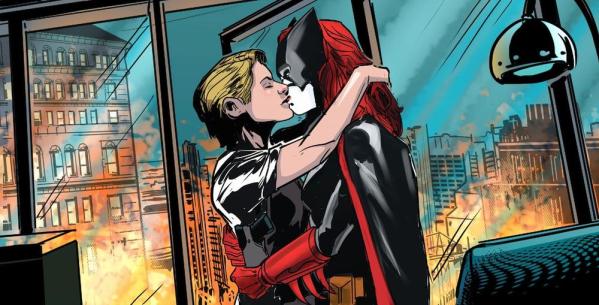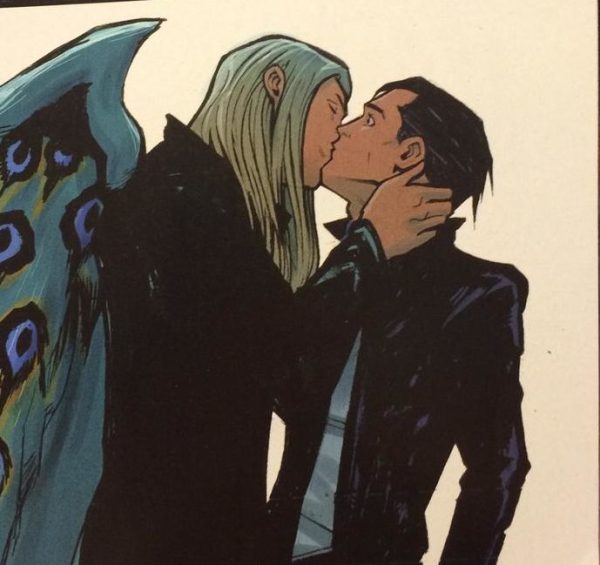
I am Sulu’s “stunned” disbelief…
Hikaru Sulu is a married man. He is a father.
His partner, as it turns out, is also a married man. A man who doesn’t have a name, by the way, though writer Doug Jeung, who played the part, says his lines in the script are labeled “Ben.”
A couple weeks ago, John Cho, who plays Sulu in the new Star Trek universe/timeline revealed that a kiss between the two was filmed and made the final theatrical cut, but was then removed from the final-final cut because to have that particular interaction between two loving, married characters would garner Beyond an R rating from the MPAA.
Huh.
Now, as I recall, there was a naked-but-for-her-lacy-unmentionables Orion female front and center in the first film, caught in-almost-flagrante by her roommate Uhura. Who proceeded to change her own clothes not realizing Kirk was hiding under the bed watching his future comm officer strip down without her consent. This is not amusing. It is voyeuristic at best and, quite frankly, makes Kirk a creeper.
PG-13. Men examining women’s bodies without consent apparently doesn’t bother the MPAA. No outcry.
Uhura and Spock are an interspecies couple. They kiss plenty. No one took issue with the fact they’re from completely different planets.
Their lip-locking didn’t affect the MPAA rating (nor, for the record, should it have).
Christine Chapel got her kit off, but for her underthings in Into Darkness. Yet again, the esteemed Captain takes the opportunity to ogle despite her expressly asking him not to.
I’m starting to repeat myself.
Given all of this, why is it that, if a man kisses a man he loves by mutual consent, the MPAA throws a tantrum and slaps an R rating on an otherwise PG-13 film? Why is it unacceptable for individuals in a committed relationship to show affection for one another when Checkov is getting tossed shirtless into a corridor after a casual encounter? (For the selfsame record, I don’t have an issue with consensual casual sex, I’m just making a point about heteronormativity and movie ratings.)
In most Western cultures, kissing is a way for people to show affection for one another. There are different sorts of kissing, of course; the way one says goodnight to one’s children should be markedly different from the way one says goodnight to one’s significant other. We’re speaking here of the way consenting adults demonstrate their love. It is an act of intimacy, a reconnection, the reminder of a close bond.
Nothing less.
Nothing more.
The gender of those doing the kissing should be incidental. Two men kissing, two women kissing, a woman and a man kissing… all of those permutations are people in love kissing and it shouldn’t be a Thing. It shouldn’t have to be a Thing.
We shouldn’t need to have this conversation anymore. Those of us who are part of the LGBTQ community (for the record, I’m bi. Yes, my husband knows; no, he doesn’t care) shouldn’t have to express our shocked joy at seeing same-sex kisses on screen nor should we have to defend them. Heterosexual people who love one another kiss on screen and no one thinks anything of it; why should it be any different for us? Why is our love so much less valid that its expression becomes the subject of countless articles, arguments, commentary, and changes in film ratings?
If Sulu’s spouse had been a woman, they would have kissed. They might even have had naked grown-up time without anyone batting an eye or changing any letters around on the movie poster.
But he is and they didn’t.
Thankfully, comics are picking up the slack movies continue to let out. They are doing for us what film isn’t or, more distressingly, won’t.
They are allowing us to love.

Writer: Robert Rodi
Artists: Jackie Lewis and Marissa Louise
Merry Men is a retelling of the Robin Hood story with the twist that Robin and his men were forced to flee into Sherwood Forest to escape persecution due to their sexuality. Author Robert Rodi is using a familiar framework to explore a new idea while simultaneously giving us a glimpse, in the Sherwood microcosm, of what our world could, and should be: a place where people are free to be who they wish (be that gay, straight, transgendered, or otherwise), to be true to their souls, to love who they will, and to express that love without it being remarked upon in any way other than joy that two people who are in love.

Writer: Holly Black
Artists Lee Garbett and Antonio Fabella
In this month’s Lucifer, Raphael discovers an ugly truth and then saves himself with one of the only things he concludes is truly important: love. That he loves a man is incidental; that it is love which saves him is not.
So, just to be clear…
This is love:

And this is love:

Just like this is love (and yes, I am aware of the irony inherent in using this particular couple to make the point given what DC did to them):

And this is love:

And regardless of the participants or gender of said, all of these kisses mean the same thing: I. Love. You.
These are moments in the lives of people who love one another.
And if there’s anything this world needs right now, it’s a little more love.


